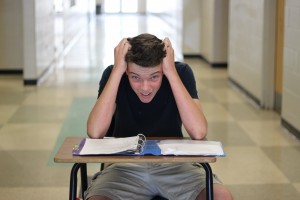
Some say farewell to school for a couple weeks, waving assignments goodbye. Others leave the building but cannot escape work. While the sea of assignments varies in depth among students, there is always a group of pupils that experience the stressful and scary “Holiday Overload.”
“Holiday Overload” presents the common dilemma of successfully juggling one’s schoolwork, social life, and leisurely activities. During the holiday breaks, however, students are expected to complete their heap of assignments and enjoy a long deserved vacation from the pressures of school life at the same time. Being a student who is experiencing this plight, I believe this expectation defeats the purpose of taking Thanksgiving Break and Winter Break. While we don’t have to commute to school at 6 a.m for a couple weeks, all the work that is missed in the classroom makes its way into our houses.
Assigning work to students during vacations is not such a new and cruel practice in American school systems. However, requiring such a vast amount of material for students to complete does not allow them to fully enjoy their rest. I texted acquaintances, went to the movies with friends, and visited relatives during Thanksgiving Break. My mind was absent even though I was physically present. I was mentally keeping track of upcoming due dates, test dates, and the work I needed to complete by my return to school. I finally realized that the frantic thoughts about my pile of schoolwork were hindering my period of relaxation.
What is the point of sending students away from school if teachers will assign a hefty amount of work?
Attending family gatherings and activities is also a required part of holiday breaks. Parents often plan trips during the winter season. Teachers could not possibly be ignorant of this fact. Instead of assisting students by ensuring that they remember material taught before Winter Break, completing more work harms them. Breaks are the few instances during the school year where I have the opportunity to heal my mind (which is constantly on work mode). How can students recuperate from intense anxiety caused from balancing work and leisure when assignments dominate their thoughts?
Teachers assigning less material during school breaks in response to the grievances of students would only occur in a perfect world. While “Holiday Overload” is hectic, students should dedicate their effort taken to complete work into ensuring that they also relax during vacation time.
Completing a portion of one’s work in the morning throughout the week can prevent the dreaded, Sunday-night study session. Designate at least two “fun days” for relishing the company of friends and family. In the (common) situation that an essay or project has not been touched until the last day of Winter Break, abandon all distractions (phones, game consoles, television, etc.) and get working. A simple rule I follow is this: work hard to play hard.
As Christmas jingles, pies, and colder weather sweeps in, so does a blizzard of work. While a pile of homework is not a desirable gift to receive during Winter Break, students are required to complete it. However, it is crucial that we remember our assigned material and mental health. School breaks should be a time for rehabilitating one’s brain and forgetting about the hardships of school life— not for constantly worrying about work. Dedicate time towards play dates, not only due dates. By focusing on finishing assignments and taking a mental break, hopefully students can overcome their overload.